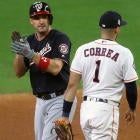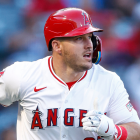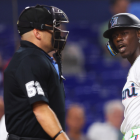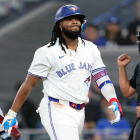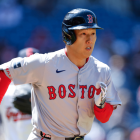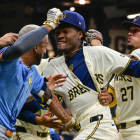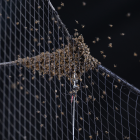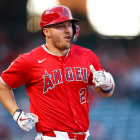The Washington Nationals defeated the Houston Astros 12-3 in Game 2 of the 2019 World Series on Wednesday, thus giving them a 2-0 lead in the best-of-seven series. Play will now shift to Nationals Park in Washington, D.C. beginning with Friday's Game 3. Depending on what happens over the weekend, the earliest the series could return to Houston is next Tuesday for a potential Game 6 (and, if need be, a Game 7 on Wednesday).
But before we go down that road, let's revisit six things you need to know about Game 2.
1. Seventh inning meltdown dooms Astros
The final score betrays the fact that the teams entered the seventh tied at 2-2. Really.
Justin Verlander was back on the mound for the Astros, and promptly allowed a home run to Kurt Suzuki, who made a little history in the process. (Suzuki also notched another hit and threw out Jose Altuve on a steal attempt earlier in the game.)
Kurt Suzuki is the oldest catcher (36 years old) to go deep in a #WorldSeries game since new Cubs manager David Ross in 2016. pic.twitter.com/IImj8xP0sY
— MLB Stats (@MLBStats) October 24, 2019
Kurt Suzuki was hitting .146/.255/.146 with 0 XBH in 55 career postseason PA coming into tonight.
— Andrew Simon (@AndrewSimonMLB) October 24, 2019
Tonight, he's 2-for-3 with a go-ahead HR off Justin Verlander.
After a walk to Victor Robles, Verlander departed for Ryan Pressly. That's when the game went off the rails. Take a look at the play log:
- Trea Turner walked;
- Adam Eaton sacrifice bunted, advancing Robles to third and Turner to second;
- Anthony Rendon flied out;
- Juan Soto was intentionally walked (the first Houston issued all year);
- Howie Kendrick reached on an infield single that could have been called an error on Alex Bregman. Robles scored on the play to make it 4-2;
- Asdrubal Cabrera singled to center. Turner and Soto scored, making it 6-2;
- Ryan Zimmerman reached on an infield single and Kendrick and Cabrera each scored on a Bregman throwing error to make it 8-2.
The Nationals would keep pouring it on, but by the time the seventh inning concluded the game was, for all intents and purposes, a boat race.
The @Nationals' 10 runs in the 7th inning or later tonight are tied for the most ever in a #WorldSeries game.
— Stats By STATS (@StatsBySTATS) October 24, 2019
The Athletics also scored 10 in the 7th or later in Game 4 of the 1929 World Series against the Cubs.#STAYINTHEFIGHT
Interestingly, the seventh was the first time all year that Verlander had worked with a catcher other than Robinson Chirinos. Manager A.J. Hinch had pinch-hit with Kyle Tucker the previous half inning. Whether that impacted Verlander or not, who knows. It presumably made no difference for Pressly.
Justin Verlander is going to throw to a catcher other than Robinson Chirinos for the first time all season in the top of the 7th.
— Jake Kaplan (@jakemkaplan) October 24, 2019
By the way, those three hits ("hits") that broke the game open? Their exit velocities were 83.5 mph, 75.7 mph, and 62.8 mph. You don't always have to hit them hard if you hit them in the right spot.
2. Ace-off doesn't deliver
Both Verlander and Stephen Strasburg allowed two runs in the first inning, and neither had their usual dominant start. The pitching was fine-to-good throughout most of the game, but it's fair to write the matchup didn't meet expectations overall.
Verlander, for example, finished his night with six innings, having permitted seven hits, four runs, three walks and six strikeouts. Some of that damage is owed to the aforementioned Pressly, who allowed his inherited runner to score. Unfortunately, for Verlander, a solid start isn't what he needed to fend off some undesirable history:
Justin Verlander has the fourth-highest ERA in #WorldSeries history.
— CBS Sports HQ (@CBSSportsHQ) October 24, 2019
1. Don Newcombe (8.59 ERA)
2. Carl Erskine (5.84 ERA)
3. Hank Borowy (5.76 ERA)
4. Justin Verlander (5.73 ERA)
5. Don Sutton (5.26 ERA)
(*minimum 5 WS starts) pic.twitter.com/O9qqwUZzON
Justin Verlander has allowed nine first-inning runs this postseason, the most for any pitcher in any postseason in @MLB history. #WorldSeries
— Elias Sports Bureau (@EliasSports) October 24, 2019
Strasburg, for his part, notched a quality start: six innings, seven hits, two runs, a walk and seven punchouts. It was the third time in his career he topped 110 pitches in consecutive starts, speaking to how he's ratcheted up his workhorse tendencies here in October.
3. Nationals keep rolling
With their Game 2 victory, the Nationals have now won eight consecutive games. Remember, they won Games 4 and 5 against the Los Angeles Dodgers in the NL Divisional Series, then swept the St. Louis Cardinals in the NL Championship Series. It's at least conceivable that the Nationals could finish their year having won 10 in a row.
The Nationals even beat Gerrit Cole and Verlander in consecutive games -- something no other team (or teams) could do all year:
Gerrit Cole and Justin Verlander have not taken the loss in consecutive team games all year.
— Jon Morosi (@jonmorosi) October 24, 2019
That will happen tonight, barring a remarkable comeback, in the #Astros 175th game of the season.
What's more is that the Nationals' run really started during the late stages of the regular season. The Nationals won their last eight games in September. Add it all up, and Washington has won 18 of its last 20 contests. That's absurd.
4. Rodney makes history
With the game well under control, the Nationals were able to avoid using Daniel Hudson, Sean Doolittle, or even Patrick Corbin in Game 2. Rather, Davey Martinez turned to Fernando Rodney, Tanner Rainey and Javvy Guerra for the final nine outs.
The most important tidbit from those three innings? Rodney's appearance, which completed a somewhat cool accomplishment. Rodney has now appeared in the World Series with an AL and NL team, he's pitched in each Wild Card Game, the ALDS and NLDS, and the ALCS and NLCS. Basically, if there's a postseason option, Rodney has appeared in it.
That makes Rodney just the fourth player to ever do that, joining Carlos Beltran, Ben Zobrist and Jon Lester:
It's official.@Nationals RP Fernando Rodney is the 4th player EVER to play in every single round of the Postseason in both leagues. pic.twitter.com/HgQKsvWt3z
— FOX Sports: MLB (@MLBONFOX) October 24, 2019
Rodney threw a shutout inning, though he did permit a walk.
5. What history says
What does it mean for the Nationals to be up 2-0? Alternatively, for the Astros to be down 2-0? Good thing you asked.
According to WhoWins.com, MLB teams to go up 2-0 in best-of-seven series have historically went on to win those series 84 percent of the time. Road teams to do it have won roughly 89 percent of those series. In other words, empirical data suggests the Nationals have greater than an 80 percent chance at winning the World Series. The Astros, conversely, are at less than 20 percent.
Do note that those numbers are skewed just a bit by the years that home-field advantage in the World Series was determined by the All-Star Game. The point remains the same -- it's a great development for the Nationals and a horrible one for the Astros.
6. What's next
The Nationals will now host the next three games in the series, beginning with Friday night's Game 3. Remember, the World Series follows a 2-3-2 format. That means the Nationals need to win only two of their three home games in order to claim the championship. Alternatively, the Nationals need to win just one home game and one more road game.













